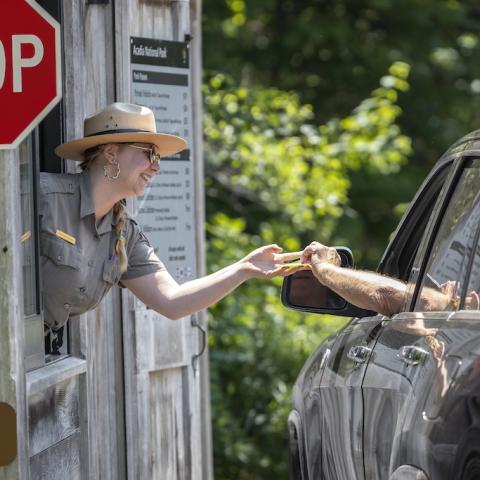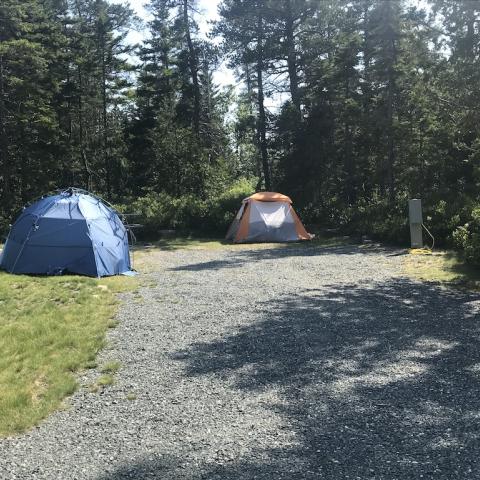
A $10 million campaign has been launched to build housing for Acadia National Park seasonal workers/DOI
With housing woes for National Park Service employees not expected to be resolved in the near term, Friends of Acadia continues its work to find, or create, housing for Acadia National Park employees.
While in the past the nonprofit has purchased housing or land for housing, it now is pushing a campaign to raise $10 million to build housing for seasonal workers at two campuses in the park. So far $7.5 million has been raised towards the goal.
The Raise the Roof fundraising campaign is part of Friends of Acadia’s commitment to help solve the severe housing shortage on Mount Desert Island that’s impacting Acadia’s ability to hire enough seasonal workers.
“Seasonal workers are the backbone of Acadia’s operations from May through November,” Friends of Acadia President Eric Stiles said last week during the group’s annual meeting. “When we build seasonal employee housing at the park, we’re building a better visitor experience, a better community, and a better Acadia. But we can’t do it without our friends. Every dollar, every contribution will help us achieve our goal.”
For the past several years, about 30 percent of Acadia’s seasonal jobs were left unfilled. As rental prices increase and housing inventory decreases, a dire housing situation is only getting worse. Building new housing units at Acadia is imperative for a meaningful and sustainable long-term solution, the friends group said in a release.
“Seasonal employee housing is critical to our workforce here at Acadia National Park. We need 150 summer seasonals, and yet for the last several years we’ve only been able to hire about 115. Part of that is because of the lack of seasonal employee housing,” Acadia Superintendent Kevin Schneider said during Friends of Acadia’s annual meeting.
“We only have about 90 beds park-wide. And so being able to provide a bed for our workforce is crucial to allow them to take a job and help us preserve this magical place for future generations. Having seasonal housing that’s affordable makes sure that we can attract and retain the brightest and most talented workforce for Acadia National Park.”
Constructing buildings within a national park requires careful consideration to preserve park values and experiences. The National Park Service and Friends of Acadia have identified two suitable sites that could provide housing for 60-plus seasonal employees: the Harden Farm property in Bar Harbor and the Dane Farm property in Seal Harbor.
Both sites are conveniently located near village centers, near Island Explorer routes, and have access to public utilities. And because only the NPS can build on park land, these projects are not competing for building lots for other workforce housing efforts.
Friends of Acadia purchased the Dane Farm property in Seal Harbor last year and is well underway on the construction of two residential units with eight bedrooms. When completed, Friends of Acadia will donate the structures and property to the park, and seasonal employees are expected to be living there by Spring 2025.
The larger Harden Farm property is already home to eight existing housing units and has been identified as a location for the expansion of workforce housing since 1959. This property would provide a planned 50-60 additional beds for seasonal workers in two phases of construction.
The National Park Service is leading project design and development and hopes to begin phase one construction at Harden Farm later this year. Friends of Acadia’s Raise the Roof donation of $10 million will unlock another $10+ million in matching funds through federal and other funding. The dynamic partnership between the park and Friends of Acadia positions Acadia National Park as a leader in tackling a housing crisis that is plaguing national parks across the country.
The friends group in March 2023 also purchased a bed-and-breakfast inn in Southwest Harbor for seasonal housing. When the inn was purchased, Stiles said it was part of the organization’s goal to add 130 beds over the next ten years for the park and its partners.
“We’ve developed a three-pronged approach that includes: 1) Adding bedrooms to existing park units, 2) Repurposing commercial properties, like the Kingsleigh Inn; and 3) Constructing new housing units on sites within Acadia,” he said at the time. While the permanent solution is to construct new housing units on NPS land that will be of minimal impact to natural resources or the visiting public, more immediate and interim measures are needed. That’s where properties like the Kingsleigh Inn come into play.”
Across the country at Rocky Mountain National Park the Rocky Mountain Conservancy is taking a similar approach to tackle the housing crisis. Earlier this month a housing complex with 16 private bedrooms has opened for seasonal Rocky Mountain National Park employees and Rocky Mountain Conservancy staff.
The conservancy raised donations to pay for the $2.85 million facility in Estes Park.




 Support Essential Coverage of Essential Places
Support Essential Coverage of Essential Places







Add comment